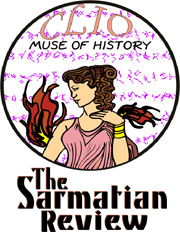| This Issue | Back Issues | Editorial Board | Contact Information |

From the Editor
September 2004
Volume XXIV, No. 3
We selected Clio rather than Mnemosyne for the title page of the issue on Remembering, because we are concerned with the public (rather than private) memories that congeal into History. Lillian Vallee captures magnificently the perpetual uncertainty in which Poles of all social classes have lived for too long. Anthony Bukoski, whose short stories she reviews, is a great chronicler of the aftermath of the historical shocks that have drained off so much Polish energy. Justyna Beinek’s dissertation (of which portions appear in this issue) discovered one of the reactions to these historical earthquakes: the nineteenth-century album in which friends and acquaintances wrote down their thoughts and wishes pertaining to the owner of the album and to his/her Polish identity. Bożena Shallcross’s book on the Polish home (reviewed by Beinek) further rehearses the same topic in the language of largely postmodern scholarship.
Quite a few reviews are dedicated to Polish American writers. In addition to Bukoski’s, a lovely book by Suzanne Strempek Shea is being reviewed; and a controversy over Mark Nowak’s poems is spelled out in two reviews by Joseph Kotarba and Sally Boss.
While the Central European intellectuals and writers continue to sort out items that will be remembered, their Eastern European neighbors feel even more precarious about national identity and its roots. Ukrainians, Lithuanians, and others are still in the process of imagining their historical narrative. Their Clio remembers very selectively. For instance, Lithuanians have abandoned the memory of their 400-year-old ties with Poland (we shall return to this tendency in a forthcoming issue of SR). In his review of Olga Hnatiuk’s book, while praising the author for her accomplishments, Professor Jan Kieniewicz tactfully reminds her that she suffers from a similar amnesia with regard to Ukrainian history and its Polish component.
A selection of seventeenth-and twentieth-century poetry breaks up these historical debates and reminds us, in Theophile Gautier’s words, that poems last longer than cities. Finally, Professor Robert Cherry offers us his take on some aspects of the Polish-Jewish dialogue. ∆
Back to the September 2004 Issue
The Sarmatian Review
sarmatia@rice.edu
Last updated 9/12/04